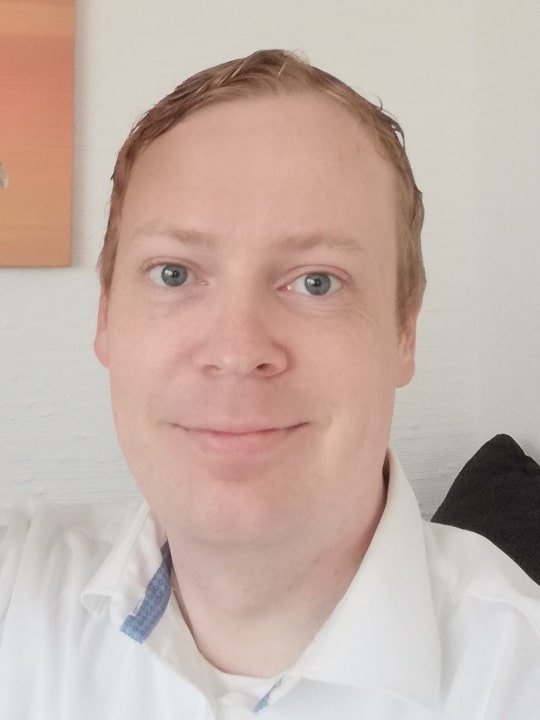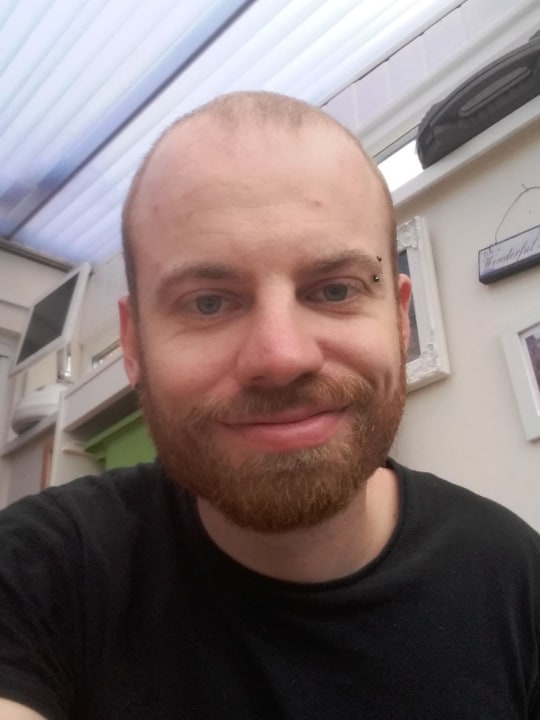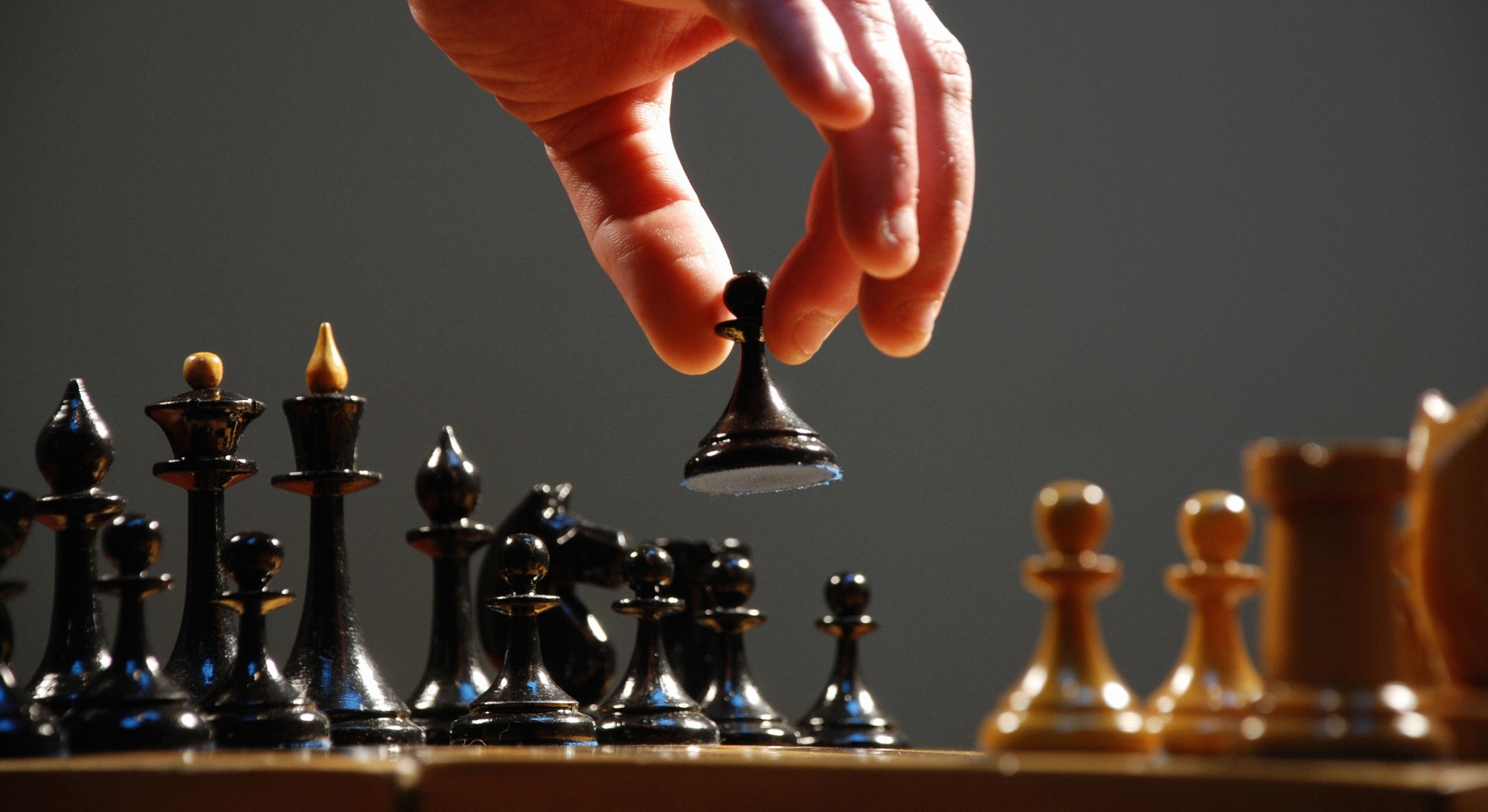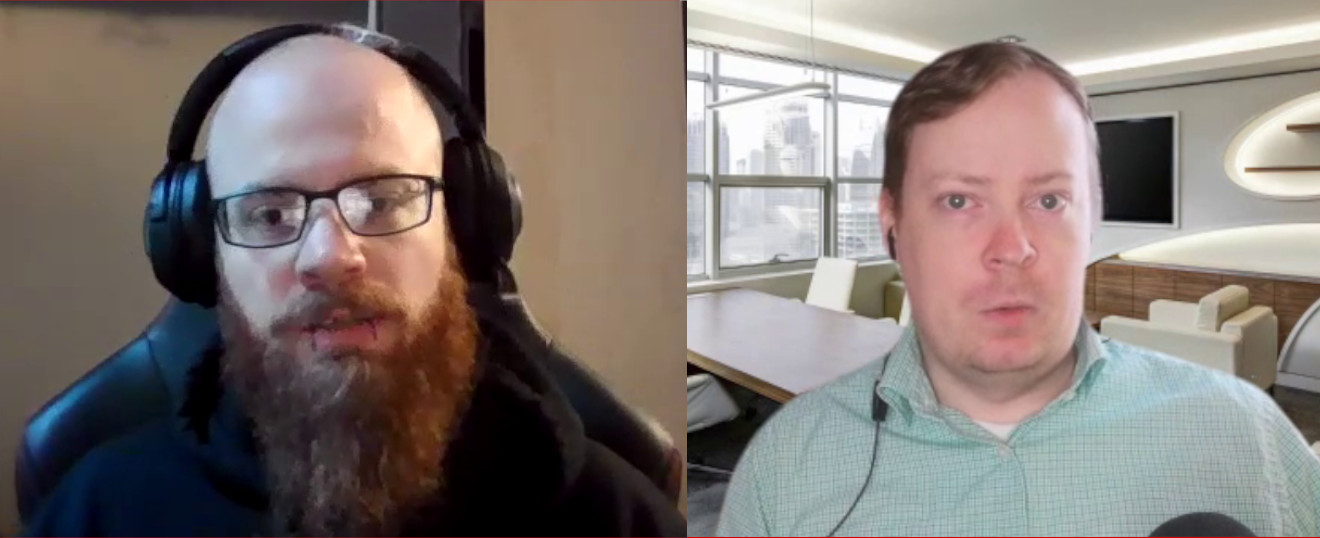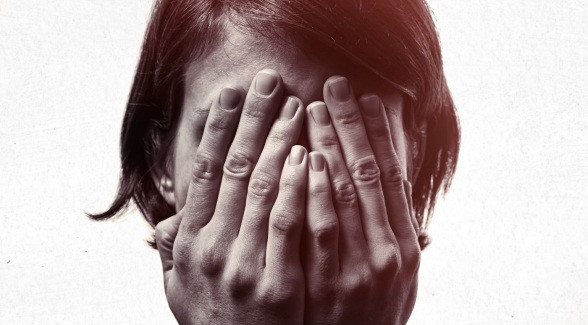William and Steven speak openly about the faith they were raised in and how they have personally identified with it. Religion can provide inner strength, a sense of belonging and community, a purpose in life, and a path to transcendence.
Watch a Short Excerpt:
Transcript (continued):
Steven: It's a good good question, a good discussion point and very complex as well, as you just kind of just showed: the fact there's so many different multiple ways you can respond to these things. But I think, so in religion, what you talked about is a great parallel with that, and psychology and mental health at the moment. So again, this is my own personal views. But you talked about being honest about an emotional situation that's difficult, or just even talked about a little bit about it. You don't need to open up completely, because it leads to isolation if you don't. Because you feel that everyone else is doing fine and doing well, because that's what you see, you go "Oh, well I'm doing bad. So I don't feel I don't feel happy. Or I don't feel complete. Or I don't feel good about something, but everyone else is. So it must be different and weird and alone or whatever." So into psychology there's often a teaching about how you can't say the words "Oh, I understand." You know, if someone talks about their situation you can't go "Oh, I understand", because you can't understand that, because you're not in their specific circumstances. And I do completely understand and get that. But we experience the same emotional responses. So you know, as human beings we all have, you know, happiness, sadness, pain, love, joy, bliss, disappointment, jealousy. All these different things that we have, they are what connect us. So in a psychological point of view, actually, when you're discussing something, if someone actually shows they do understand the emotions you're going through it creates a bond, it creates a connection I think as human beings we're lacking in this day and age. It's a lack of community, a lack of connection through things like Facebook and social media projecting false identities of just happiness and other positive things. And that happened at the church scenario of Christian religion, where you project the positive happiness. Because that's, you know... happiness is great. It's good. But actually, if that's but a lie, if you're also struggling, you need to be able to talk about that. You need to be able to talk about those things and actually cry about something that you're struggling with, or talk about it. But you don't feel you can because the way the community currently has almost shot itself in the foot, to use that phrase. You know it's because they're too busy trying to be righteous and good, they forgot how to be human, and how to be honest and open about their emotions, to create those connections. There's nothing like my spiritual experiences. I believe the term "spiritual" and "emotional" I think are very closely linked, personally. And I think when you have an emotional experience with someone, whether you bond through hard times or good times, it creates a spiritual bond. And I think that's probably what church actually is designed for. We talk about going through a meeting in a church, and we talk about community, as I think the foundation should be built on emotional connections. Not everyone can. It's difficult for people. But again, over time you can facilitate that. So I can understand totally why you struggle, well I struggle with it as well, and why it's difficult.
William: Yeah. That's true. Some people believe that can just sit in their garden and meditate, and get the same spiritual experience and connection to God as in church. But that community aspect is huge. Because, even if you are experiencing only positive emotions, there's plenty of opportunity to serve others who are not. So sometimes you're more a taker, and sometimes you're more giver. And both are needed. Alright, so we talked about social and emotional and psychological aspects of church and church community. But is a church just club, just a society that people go to to share experiences, to be there for one another? Or is there actually another layer to it that makes a bond between a person and God? You earlier mentioned something about singing taking it to the next level. And I believe you were talking about Christian principles motivating you to be there for others rather than just common sense and empathy. So what what is this extra level, if there is one, that makes religion and faith so important to us and other people, that goes beyond just being a club or unity, a union of people?
Steven: I guess the obvious answer is: try to know your place in the universe. That's why people do it, I think. Whether you believe it's true or not, or whether you believe something like... because we could go into a massive debate about all that. No matter what the discussion point in that respect is, I think people, to answer the question, a lot of people need to have something to ground them in this massive universe that we live in. And having a deity, a creator, a perfect figure... and sometimes not a perfect figure. Obviously in Norse mythology, Greek mythology all their gods definitely weren't perfect. They were definitely fallible. It's only really a Christian concept, Judeo-Christian concept, of a perfect being, being God. The whole reason we did the podcast is "Who am I?" And I think that is why people gravitate towards religion, I think, and create it. And that's what makes it more than just a club. Because a higher function I think about...
William: Okay, so if I think of the Maslov hierarchy, often shown as a triangle or a pyramid, you are talking about the human need that goes beyond immediate needs like shelter, food, clothing and what comes after that: friendship, community. I don't remember all the details right now. But you're getting to the to the top layer that is called "transcendence" or "self-actualization", stuff like that. So when you start asking big questions. You call it your place in the universe. Or I would say "What is my purpose in life?", "What is the purpose of humanity as a whole?", "What use is it to do good in general?" What is all this good for? Because the minute you start getting a bigger picture because you've taken care of the lower-level necessities of life, you start with more questions. Because life is infinitely complex, and there will always be more challenges, more questions. And I love that about life. It makes it a great adventure. But it also means that there's always more ways you can suffer, to put it bluntly. Because, well, that motivates you to change and to seek new approaches, new answers. So is religion always the way for people to approach these questions? I think it's not the only one.
Steven: No.
William: Meditation, study of any kind of books, history books. It doesn't have to be religious books. Just just seeking more insights, I think, is a natural tendency for people who ask these questions. Some people just go under with these questions and will become depressed and maybe start drinking, or you know go in another way if they feel overwhelmed by the challenge, or become suicidal because they believe there is no answer to questions like "What is the purpose of life?", and they will start to believe that that there is no purpose and that life is just a big illusion, stuff like that. So it's tricky to go that way. And I think that's why there is a certain order to the steps that you take in the Maslov hierarchy. You shouldn't do too many challenges at the same time.
Steven: Purpose, as you say, purpose. No matter whether it's religion or just in life in general, we all feel we need to have a purpose. I mean kind of side tangent here: things like male depression and male suicide is at an all-time high in society. It's because a lot of men don't feel they have a role or a purpose in society. That's completely a different side topic by itself. But even at a basic level of needing to be in a football club with people or having a job or having a family, you have a purpose. You fit into a situation. So like you talked about with religion: religion creates a situation where you have a role or a purpose. You are God's child, one of God's children on this earth who will give you, he will give you, they will give you exaltation, everlasting life, heaven, that bliss, whatever. You're given a purpose through that scenario in Christian-Judeo religion, obviously with coming from a very much Western... Because there's so many other religions we'll talk about, I'm sure, in the podcast at some point.
William: That goes into the question "Is there life after death?" Right? "Or does life just abruptly end, and then it was like you never existed all of a sudden?" So yeah, I can understand how that is a huge question that a lot of people confront some time in their life.
Steven: And it can be both, like you said, trapping and freeing. So you talked about being trapped: if people don't really have a purpose or that there's no life after death, then what's the point? Then they go suicidal or whatever. Actually it's very freeing as well. It's very much... if you actually go to that point where you're like "Ok, I don't have to worry about my choices. I'm a good person. I'm not goint to kill someone or something, whatever. But I don't have to worry about the guilt and the overanalyzing of my behavior, that God might judge me or people might judge me", then you become actually, in my opinion, a very much happier person. I have become a much happier person since not being around the environment. And for me personally that's very freeing. And I still, you know, I believe in a life after death. But even if there wasn't I'm like "Hey, this is cool. I'm doing very well for who I am as a person. I'm not going to save the world, and I'm not trying to kill anyone. But I'm within my little bubble, sphere." It's like "I am doing exceptionally well as an individual." And I think having a, I guess, the life out of death scenario, whether you have it or not is very much up to the individual, how they respond to it, I guess. Because some people, you know, will freak out with that and need the purpose, which religion really helps provide, no matter what it is. And sometimes people aren't religious and still believe in life after death; well they believe that there is something after. Most people do, I think. Most people think that, hope there is something else after life.
William: I've noticed that, too. I've talked to several people who do not have a formal faith, do not associate with a certain religious community, but they certainly wish, they certainly have the desire, to stay united with their loved ones. So that's a very common thing. And so that will motivate some people to investigate a religion.
Steven: The LDS church itself provides that. They provide a lot of discussion, a lot of teachings about, you know, what came before we are on this earth, earth life, and then post-earth life, obviously death. And there's a lot of really interesting facts. Some of the things that I've been most drawn to, I think, in a theological aspect, of what they teach. Again, people can look at it for themselves.
William: I just noticed with your last comment that this answer about life after death does not only get into the purpose of life, but also your old value system. So you mentioned "Am I a good person?" And then apparently, I haven't thought this through, that's why I'm just noticing it now, apparently the answer to "What is my purpose in life, or of life in general for humanity?" will also give you an orientation of "What should I be spending my time on, my energy?", "How should I treat myself and other people?", and "Am i doing well in life?" Because a goal sets a path that leads you to that goal. So it's not just a thing about what happens at death or thereafter. But what leads up to that point? And what should I be doing before? We like to say in the church "Now is the the time of our probation, when we prepare for what comes after."
Steven: The choices now we make is very much a key factor, I guess, isn't it.
William: Yeah. We believe that small things that we decide and do now can have eternal consequences. That sounds very drastic, and it can feel overwhelming to people who haven't fully understood the plan that God has for us.
Steven: Well, the principles themselves often in all life, again, in my opinion, is... It's up to us whether we put a positive or negative on them. So in that situation of what we do now affects our eternal existence. Well that can be terrifying, or that can be very hopeful. It's literally a choice that we have to make. You could be like "Ok, great. I'm doing I'm doing good now." So, you know, "I'm a good person. I'm doing well." Often we seem to always jump to the negative, whether this is a cultural thing or a human thing, where we just go "Oh, I'm not as good I should be." or "I'm terrible." or "I stole a sweet last week." or whatever "And now I'm going to hell". And it's like, okay well that's a bit of a dramatic negative that we seem to just default to often. And actually if we think about things in a boarder sense, if we looked at them objectively, we'd realize how well we're doing and wouldn't have to fear, wouldn't have to worry. But I think we spend so long in the church, in life in general, focusing on what we SHOULD be doing and not actually how well we are doing.
William: Right.
Steven: That has a massive impact on the psychology. And I think a lot of the negatives that the world sees about religion and spirituality are much a reflection of humanity's ability to jump to a negative before looking at a positive, I think. Because in the community, in a church, in whatever, we all do it. We all seem to just jump to the negatives first. At least that's my observation And when actually things are negative they just are. And it's up to us as individuals to... which takes time. It takes decades, it takes years. It takes a long time to make those realizations and concrete them in our behavior.
William: Yeah, usually long after we've already raised children and handed off the those false beliefs to the next generation.
Steven: Yes. Again, it comes back to "Who am I?" All these things we're talking about, they help us to explore who we are as an individual, as well as a culture and community.
William: I just thought of something philosophical having to do with what you said. I do want my decisions to matter. I do want there to be consequences. Otherwise I would probably lose all motivation to make any decisions. At the same time I don't want there to be too strong of a consequence. I don't want the judgment about my decisions and behavior to be too stark. I want to be judged more by my intentions than my actions. Because somehow this life is created in such a way that there is a huge gap. And some days I wish my actions were one-to-one aligned with my intentions. But then again, there would be no room for mistakes or progress. So you can see how there's this huge setup necessary to make freedom of choice possible but also not fatal. And I believe that the earliest church has an amazing take on this problem. It's not complete. It doesn't answer all the all the great philosophical questions that people have had through the centuries. But for me personally, it helps me with questions like free will and "What should be the norms and the maxims of a society?" and "Is there a need for an authority, like, in this case, a God?" So I don't know how deeply I should get into that. But we could talk a whole episode about stuff like that.
Steven: When I talk to people about religion and stuff and talk about my background, I often tell them "If you ever want to explore yourself through a microscope, you know, go to the LDS Church. If you ever want to go and learn something that will give you a new insight, something new, something deeper than what we generally experience through life, then go spend two months, six months, a year, living that lifestyle and learning what is taught there. Because I'm such a deeper, more connected, more loving human being because of what I've learned from the LDS church. All the experiences, they were come across as positive or negative, as a whole my personality, who Steven is, is a thousand times better just for being through that experience. And again, whether you believe every single principle it teaches, or the hierarchy, or some of the traditions, whatever, all that aside, it is just so much better in my opinion for a person to go through an experience like that with what the LDS Church teaches about our place in the universe. It's quite incredible.
William: We have some amazing philosophical discussions. And the approach can be quite different than what we're used to from science and, you know, scientific philosophy. But as you were talking my mind just skipped to a negative interpretation what you said, just like you said earlier. And I just want to cover it a little bit in case anyone else had the same thought. So maybe you can clarify. It just sounded to me like a scary thing that our church could be one of those crazy religions you sometimes hear about, I don't want to name any names, that psychoanalyze you all the way through and through.
Steven: Oh, yeah. I meant as an individual. So if you want to. No matter what you do in life, it's your choice in many situations. So when you go to the LDS church, THEY won't do it. It's you yourself.
William: Exactly.
Steven: Sorry. I should clarified that. It's not like they're gonna...
William: No, it's fine. It's fine. I agree with everything you said.
Steven: From an individual point of view, if you want to learn more about yourself.
William: Yeah. It's entirely voluntary. And you set your own pace, how much I want to delve into your your psyche, your fears, your past. I don't really feel a pressure to go into that. Actually, I feel our lessons are often too superficial and not personal enough.
Steven: I meant as a natural process, just by being in the community. I wasn't explicit enough. It's like you sit down, you go "Okay, today I should psychoanalyze myself in this way." I just mean in general. So I didn't clarify that. So I apologize.
William: There is no brainwashing, there is no breaking you down and destroying you so that you can be built up properly from the beginning. There are sometimes opportunities, and again, voluntary, to speak to a leader, we call them bishop, the leader of the congregation, and to reflect. So he he might ask personal questions about how you're doing in life. And it's just an opportunity for you, if you want more support from the church, to open up about it. I like this, that you don't have to be totally proactive, that, you know, some people need a nudge and encouragement to even ask for help. It can be very difficult for some people, including me.
Steven: I've had some amazing leaders and some absolute, this sounds terrible, but some absolutely horrifically bad, unempathetic leaders. It's a fascinating. And we're all just human beings, just going through this process of learning. And more of the insightful things I've been able to achieve or discuss or whatever has just been with general members or people in the community. And, as you say, it's nice to have that choice of a backup of going to speak to someone who's in a position of authority, a position of leadership. But the interesting thing is that, yeah actually, I've gained more insight from you about who God is and our discussions about that kind of thing and what we believe than I ever did from any of the leaders.
William: Yeah. It shows you that you need to be proactive and get some some insights from your own studies, your own discussions, your own friends.
Steven: It's friends, isn't it. It's friends and family. It's just being able to have a community that's like a family. And you pick and choose. You know, you can't be friends with everyone. You can be friendly with everyone. But you have to create a small network of people who are like-minded, if that's what you want. It's up to what you want. You can go church, and that's it. You know, you'll learn and experience things that way. Or you can go and throw yourself into getting to know a few people and making those connections we talked about earlier. And they will help the whole "Who am I?" situation quite a lot.
William: I feel more fulfilled for having a spiritual aspect in my life. I could have a good life with my passions for science, for traveling, for the exchange with other people on levels like emotional, psychological, intellectual. But I need more, personally. I need to feel a purpose in life, a direction. And I need it to not be told to me. I need it to find it for myself. I have found it partially. But the search and the desire for direction goes on. I'm kind of happy that it's not all there yet. I don't know what life would be like; maybe boring, maybe fulfilling. I don't know. I'll see when I get there. But this religion is really good that way. And to answer an earlier question I gave you about it being more than just a club and an exchange among friends, I do feel a connection to God, and that it gives me a purpose and a fulfillment that nothing else has or can, as far as I know. So that is something unique, something special, and something that has broadened my perspective, and just my identity, my whole life.
Steven: I think that's a good thing to finish on. I think that's really the key to religion's actual supposed purpose. It's my personal opinion of what religion should be, is to give you that help to know who you are in your connection to God and your place in the universe, I guess.
Other Episodes:
Ep. 51: How Conditioned Are We ?
How much of what you do, think and feel comes from intentional, free chosing? How much of your actions and decisions are pre-programmed? You are the product of your upbringing, culture and genetics. What is out of our control? What can we influence? How can we counteract our predestination?
Ep. 50: What Am I Responsible For ?
Are you taking too little responsibility for your actions, or perhaps too much? How much are you able to understand or determine the consequences of your decisions? Are you in control of anything? Is free will an illusion? Can you do something to improve your thoughts, feelings and relationships with...
Ep. 49: Empathy Can Be A Super Power
Everyone has the choice of either living isolated from other people and their own feelings on the one hand, or to connect with others and their own emotional core. The road towards connectedness involves vulberability and weakness. But it leads to a very rewarding ability that includes deeper understanding of...
Ep. 48: Why Am I Ashamed?
What secrets do you have? What facts about you must never become known to others? What happens in our childhood that implants beliefs in us that hide away for the rest of our life? Can we uncover them deliberately? Can we regain the emotional freedom and levity that playing children...


